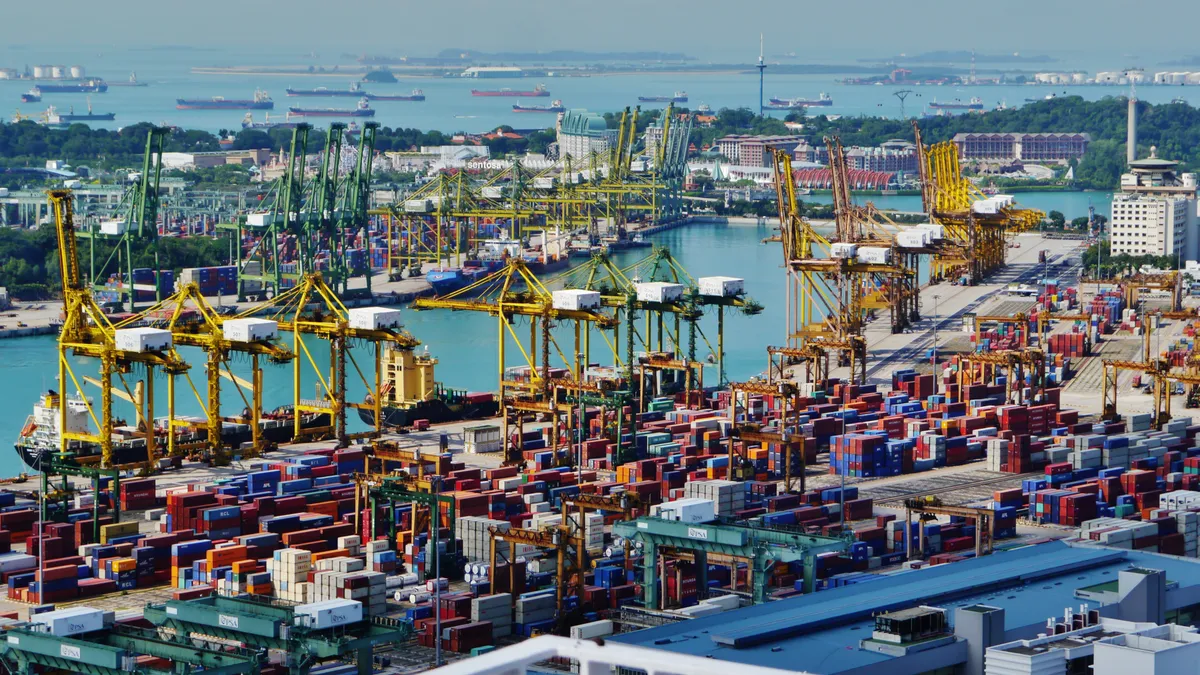Dive Brief:
- Seventy-two percent of international businesses operating in Singapore expect the COVID-19 outbreak to impact 2020 revenue, according to a survey released Wednesday by the American Chamber of Commerce in Singapore. Chamber members, which include American businesses and businesses with substantial American interest participated in the survey, according to the organization's membership directory.
- The outbreak has affected operations "to a great extent" for 43% of logistics companies operating in the Asia-Pacific region with 57% of logistics companies saying operations were "somewhat" impacted. The outbreak has affected operations "to a great extent" for 37% of companies in the manufacturing industry, another 37% said their operations were "somewhat" impacted.
- The majority of respondents in the logistics and manufacturing sector expect effects to result in revenue declines for the year with 86% of logistics companies expecting revenue to be down 1% to 10%; 70% of manufacturing companies expect revenue to fall 1% to 10% with another 12% of respondents expecting it to fall 11% to 20%.
Dive Insight:
Coronavirus and its potential to interrupt supply lines has become commonplace on earnings calls over the last month with analysts pressing executives on expectations.
"It’s a very fluid situation that we’re monitoring closely," The Home Depot CEO Craig Menear said on the company's fourth-quarter call Tuesday. "And all of our goods for Q1 are essentially onshore or on their way. So we feel pretty good about that situation."
Cracker Barrel Old Country Store updated its guidance to account for expected delays resulting from the outbreak, the company's CFO Jill Golder said on its earnings call Tuesday. "If the situation worsens, our future results could be negatively impacted by higher retail cost of goods sold and/or missed retail sales due to further delays in receiving products," Golder said.
It can be hard to shift suppliers on short notice, which can lead to supply chain disruption, according to Christoph Boehm, an assistant professor in economics at The University of Texas at Austin who published research last year studying the impacts businesses experienced following the 2011 Tōhoku earthquake in Japan.
"In general, businesses could hold parts inventories to prevent production disruptions, but in 2011 very few firms held such inventories," Boehm explained in an email to Supply Chain Dive. "It is hard to say whether businesses are better prepared today. Early examples such as Apple suggest that they are not."
Apple sent a letter to investors this month saying production at its factories in China was "ramping up more slowly than we had anticipated."
Boehm noted that while companies with more complicated supply chains could benefit during normal times in the form of a cost advantage, they could also be more prone to disruption. Going forward it is hard to predict how the disease will spread.
"This makes it difficult for firms to prepare accordingly, in particular it is hard for firms to identify potential alternative locations for new suppliers," he wrote.
Singapore has 90 confirmed cases of COVID-19, an illness in the coronavirus family — a fraction of the more than 77,000 confirmed cases in China or the 977 reported in Korea, according to the latest numbers from the World Health Organization. The survey highlights how interconnected the region is and how challenges in one country can quickly cross borders.
The survey found 39% of respondents had plans to re-evaluate business strategy for 2020. The most common response to how they plan to shift is 60% simply saying they plan to "refocus" strategy. Another 28% plan to set up alternative supply chains to reduce reliance on China, and 14% said they should move some or all of their supply chain out of China.















